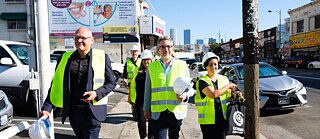(Re-) Openings of Goethe-Instituts in the US
We’ve Come to Stay

At the end of the Year of Germany in the USA, the Goethe-Instituts in the United States have strengthened their network with three completely updated institutes in Boston, Washington and Los Angeles. This is a signal of how important it is to continue the cultural and civil society dialogue between North America and Germany.
By Caroline Brendel, Lien Heidenreich-Seleme and Marina May
With the conclusion of the Year of Germany in the USA, the Goethe-Instituts in North America are setting the course for further successful, transatlantic cooperation in the future. “As a token of how much the Germans value the dialogue here in the US, we can now reopen the Goethe-Instituts Washington and Los Angeles in more beautiful, improved spaces and move back into our newly renovated, long-time property in Boston. We’re staying and we will continue to deepen our partnerships after the Year of Germany in the USA,” said Andreas Ströhl, regional director of the Goethe-Instituts in North America. In times of space shortages, gentrification and urban renewal processes in all US cities, the three Goethe-Instituts are (re-) opening in very different buildings. But they all have one thing in common: Their new formats are meant to provide space for the alternative art scene and for civil society initiatives, while new programmes are aimed at different target groups.
In the heart of the east coast city
It was a race against time, but finally arrived: a temporary permit allowing the German Federal President Frank-Walter Steinmeier to inaugurate the renovated Goethe-Institut Boston. The historic townhouse in the heart of the east coast city, owned by the German government since 1967 and the heart of the German presence in New England for more than fifty years, has undergone extensive renovations over the past two years. 354 wooden pylons that carried the building erected in marshland since 1861 were reinforced to prevent the house from sinking.
At the reopening, Frank-Walter Steinmeier gave his only speech on transatlantic relations to the chief partners and friends of the institute. He especially emphasised that we need spaces for encounters, for learning and for relationships today more than ever. The Goethe-Institut Boston is a guarantee in stone for this. He also charmingly invited the guests to sign up for a language course at the Goethe-Institut!
In the cultural centre of the US capital
After four years in temporary accommodations, the Goethe-Institut Washington – and thus also the regional management of the Goethe-Instituts in North America – found its new home in the lively 14th Street corridor. The district in the cultural heart of the city is especially popular with young people. “The history of 14th Street is marked by the civil rights movement, social decline, the artist and LGBTQ communities and now gentrification. All these topics will find their expression in our dialogue-oriented work,” reports institute director Andreas Ströhl. For the opening, the institute invited important partners from the local cultural and educational landscape as well as visitors from the neighbourhood to an open house. Outside, the Oktoberfest box attracted many interested pedestrians. Around 1,800 guests listened to the sounds of the transatlantic jazz group The New Coolnezz: Ilona Haberkamp Quartet, which was formed especially for the occasion, discussed the fall of the Berlin Wall with Danielle de Picciotto, co-founder of the Love Parade, participated in German taster courses and enjoyed the last rays of the autumn sun on the roof terrace.

Project space in downtown Los Angeles
The sneak preview of the new interdisciplinary project space of the Goethe-Institut Los Angeles began with pastrami and other specialties in historic Langer’s restaurant. Together with the secretary-general of the Goethe-Institut, Johannes Ebert, Consul General Stefan Schneider and the team of the Goethe-Institut Los Angeles, a select group of local and German partners visited the shell of the new premises. Equipped with helmets and safety vests, they entered the future Goethe-Institut in the diverse and urban MacArthur Park district in downtown Los Angeles in small groups. The Goethe-Institut invited the partners to design the project space as a common platform for innovative cultural programmes. “We expect our new environment to give us interesting stimuli for our work,” says institute director Lien Heidenreich-Seleme. “Los Angeles is always on the move and cultural centres of gravity are constantly shifting. With our new institute, we also want to reach new target groups.” Johannes Ebert emphasised that with its global network, the Goethe-Institut in Los Angeles is an exciting partner for local cultural institutions and artists.













